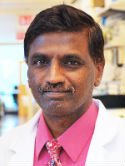| Abstract: |
The ability of stem cells to repair damaged tissues is the fundamental aspect of regenerative medicine; these functional characteristics of stem cells are notably dysregulated in diseases like human cancers. Central to developing novel cancer therapeutics is an understanding of the molecular bases of how such dysregulations are initiated in cancer patients, to define the precise cell types undergoing this stress, and to define how this new knowledge can be exploited in developing functional therapeutics, including as a basis for regenerative medicine. During metazoan development, a small percentage of undifferentiated embryonic precursor stem cells may be sorted into specific niches as adult stem cell pools in the body. Similar to normal tissue differentiation and organ development by adult stem cells, the aetiology of cancer has also been considered to be driven by the so-called stem-like tumour-initiating cells that are popularly termed 'tumour or cancer stem cells'. Tumours from several cancer types are experimentally identified to contain minor population of cancer stem cells. These cells resemble the normal adult stem cells and represent the stem cell characteristics, such as maintenance of quiescence, self-renewal potential and plasticity to multi-lineage differentiation. However, unlike the adult stem cells that are orderly regulated during normal development, cancer stem cells are dysregulated in tumorigenesis and manifest aberrant self-renewal and differentiation potentials. These processes lead to abnormal tissue homeostasis and finally the altered microenvironment of a growing tumour, in contrast to the requirements of a specific stem cell niche for the maintenance of adult stem cells. Cancer stem cells may arise by intrinsically conditioned mutations not only in quiescent long-lived adult stem cells but also in short-lived progenitor cells. The origin of cancer stem cells through de-differentiation and reprogramming of a terminally differentiated cell is also viewed as an additional mechanism. Genetic and epigenetic alterations and symmetric versus asymmetric cell divisions that regulate stem cell maintenance and proliferation respectively have also been suggested to play important roles in the emergence of terminal cancer phenotypes. An altered microenvironment of an otherwise conditioned adult stem cell, a progenitor cell, and a differentiated cell may activate signalling pathways so that these cells may become the aberrantly reprogrammed cancer stem cells. Given the progress in the field and available analysis technologies, deciphering the mechanisms that are responsible for the origin of cancer, and pinpointing the tumour-initiating cancer stem cells, will surely advance therapeutic ventures towards the best possible outcomes for cancer patients, on the one hand, and will generate leapfrogging effects in the associated regenerative medicine, on the other. © 2015 John Wiley & Sons, Ltd. All rights reserved. |



